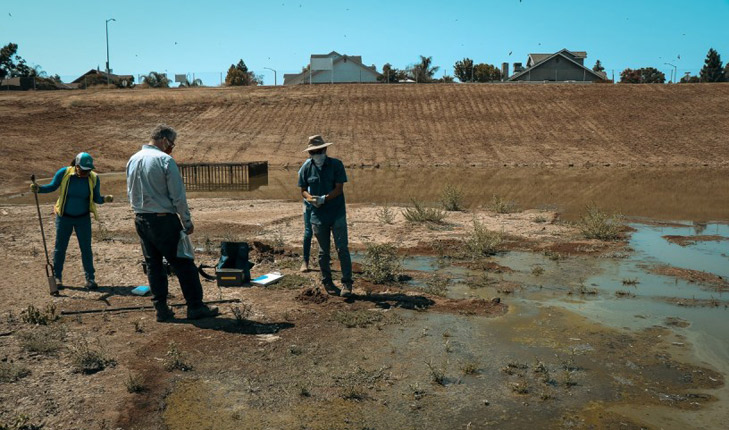Fresno State researchers have partnered with the Fresno Metropolitan Flood Control District to do soil surveys of stormwater basins and help develop a protocol for sample collection and analysis that saves time and money, while still accurately monitoring water pollutants.
Although COVID-19 has disrupted aspects of hands-on research, the partnership allows students and faculty a safe avenue to conduct valuable research that will benefit the community. Using a handheld X-ray fluorescence instrument, students and faculty from the Chemistry and Biochemistry Department and Earth and Environmental Sciences Department at Fresno State are testing soil properties, like soil moisture and grain size.
“The district always appreciates the chance to work with Fresno State, and has done so with many different departments over the years,” said Peter Sanchez, interim general manager at Fresno Metropolitan Flood Control District. “This project is a great one that could result in more efficient ways to measure pollutants carried by stormwater runoff. The real-world benefit would be put to use in the community where the students working on the project live.”
The Fresno Metropolitan Flood Control District provides flood control and urban stormwater services in a 399-square mile watershed located between the Kings and San Joaquin rivers. The area is home to roughly 690,000 people and includes both urban and agricultural land uses.
Soil samples are collected at various intervals from the outflows in the stormwater basins. The samples are taken to the lab and measured for soil moisture, grain size and elemental analyses to compare to the field-based handheld instrument. Dr. Eric Person’s chemistry and biochemistry students analyze lab-based measurements that can be compared to the measurements collected in the field using the handheld instrument.
Dr. Mara Brady is currently working with two earth and environmental sciences students, one undergraduate and one graduate student, to determine how grain size, soil moisture and organic content impact the discrepancies between lab and field-based measurements.
“This project is a great opportunity for students to learn about textbook topics in an applied setting,” Brady said. “We are grateful that the Flood Control District has provided access to this outdoor ‘laboratory’ that can be used as a learning opportunity. When students apply their knowledge to a real-world project that impacts the local community, I find that they are more engaged and excited about the final outcomes of the project. They can see how their time at Fresno State is building skills that can be used when they join the workforce and how their knowledge and experience can be used to benefit their community.”





